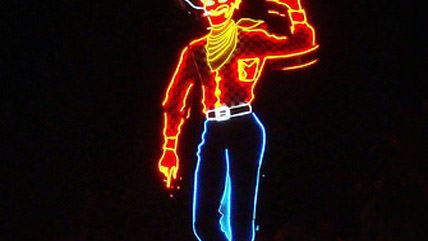Let Gamblers Gamble
Why is it only okay when the government runs the racket?

Baptists do not abide drunkenness, which is why (it has been said) they never recognize one another in the liquor store. In much the same vein, Virginia will not abide gambling.
Gaming and the laying of odds, however, are another matter.
Gambling is a low and dirty act that starts in cupidity and ends in crime, bankruptcy and broken homes—or at least so say its foes, as they have been saying for centuries. As early as 1727, Virginia adopted the Statute of Anne—which rendered gambling debts unenforceable—and in 1744 the colony prohibited gambling in public places altogether.
Such attitudes linger today. Thirty-nine states have some form of casino gambling, but Virginia is not one of them, noted a Washington Post article a little while ago. The story quoted Richard Saslaw, the Democratic leader in the state Senate: "Forty-nine states will have it before we get it," he said before adding, "maybe 48" — a nod to Utah's Mormon ways. Small chance, then, that Sen. Louise Lucas' proposal will win approval. She wants to introduce casino gambling to Hampton Roads.
Yet if gambling as an end in itself is an outrage against decency in the state's eyes, then wagering as a means to other ends is something else altogether. Thus the state runs a hugely successful lottery. And like all those in the numbers racket, Virginia's "house" fixes the odds in its own favor: Last year alone, the state raked in nearly half a billion from suckers who played its games of chance and lost.
But the official line denies that this constitutes gambling. It is, rather, government-provided "fun"—and it raises money for the schools! One hundred percent of the state's proceeds go to Virginia's K-12 education system, the lottery website notes. (It does not note that this transfer thereby frees up money for lawmakers to spend on other things.)
Likewise, you can bet on horse races in Virginia by attending a race at Colonial Downs in New Kent. Mind you, this is not gambling for gambling's sake, either. Rather, it is a way to sustain the Old Dominion's venerable equine industry. "No sport or pastime," held a Virginia judge in 1851, "has been more favourably [sic] and extensively indulged by all ranks of society in Virginia than horse racing." No one may call himself a true son of the state unless he not only knows the name of Robert E. Lee's horse (Traveller) but also can spell it correctly (two l's).
If you can't make it to Colonial Downs, you can visit one of the numerous off-track betting (OTB) parlors around the state. Off-track betting did not start up when the racetrack did, though. OTB parlors came along a few years later—and they were not sold as a means to let gamblers gamble, either. They were justified on the grounds that the track needed them to remain financially sustainable. (As Times-Dispatch sports writer Paul Woody noted recently, attendance at Colonial Downs averages just a hair over 2,000 per race—about a third of the number of fans who go to a typical Double-A baseball game at The Diamond in Richmond.) And since the track is necessary for the horse industry, and OTBs are necessary for the track, then OTBs are, through the transitive property, a means to sustain the equine tradition as well.
The same transitive relation is being applied to another kind of gambl … er, another kind of entertainment now: bingo. Roughly 400 groups around the state run regular bingo operations. But again, the playing of games of chance for money and prizes is not gambling. Heavens, no. It is, rather, a form of entertainment that raises money for worthy causes. Hence the bingo operations are overseen by Virginia's Charitable Gaming Board, even though they rake in several hundred million dollars a year by offering prizes that, by law, cannot exceed $1,000.
Make that "could not." As of Jan. 1, a new law permits "network" bingo. In network bingo, gambl . . . ah, players at multiple halls play together as an online streaming service calls the numbers from a single location. This allows for jackpots up to $25,000. The goal is to revive player interest and the revenue that comes with it, both of which have fallen off in recent years.
Fundraisers are excited. Social conservatives, not so much: Del. Thomas C. Wright of Lunenberg County, a Republican, says network bingo takes the state "in the wrong direction" because it becomes less about "a community event for people to have a good time" and more about "gambling and the money."
Well, yes.
The pretense that placing bets in Virginia is not sin-drenched gambling but merely a means to some virtuous end is growing gossamer thin. But it always has seemed fishy. An activity can be more than one thing, after all: Hunting can be both a sport and a means of feeding your family; basketball can be both fun with friends and good exercise. Some people who gamble might do so to raise money for a worthy cause—though writing a check would be less work and more direct. Most are gambling in order to gamble.
In that regard, casinos are no different than the lottery—and there is no good reason to allow one but not the other.
This column originally appeared in the Richmond Times-Dispatch.


Show Comments (21)